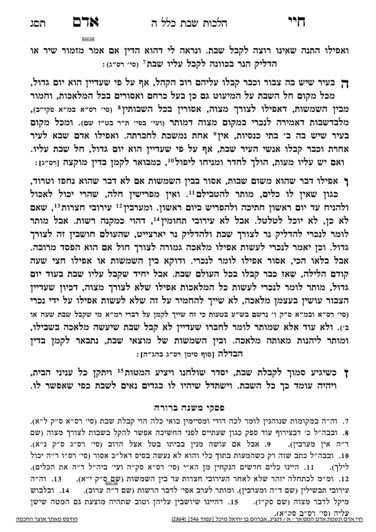We are beginning siman 6, where the Chayei Adam will give a comprehensive overview of what is muttar and assur depending on when one accepts Shabbos, and depending on who accepts Shabbos (individual or community).
We will begin with an introduction. The Gemara in Eruvin brings a machlokes between Rebbi and the rabbanan about whether a shvus (issur derabanan) is permitted during bein hashmashos. All agree that issurei deorasya are assur. The rabbanan hold that a shvus is also assur, but Rebbi holds that Chazal did not prohibit a shvus during bein hashmashos. From the flow of the Gemara afterwards, and the understanding of the rishonim, it is clear that even Rebbi limits his opinion to a situation of a mitzvah or a significant need.
There is a Gemara in the second perek of Shabbos, which says that when it is a safeik whether it is already bein hashmashos, it is muttar to perform hatmana, take maaser from demai produce, and create an eruv chatzeiros. The Gemara asks that this statement does not appear to be like Rebbi nor the rabbanan, but explains that it is actually in accordance with both. Even the rabbanan agree that although shvusim are assur during bein hashmashos, these three are muttar. The Gemara explains that hatmana is assur out of concern one will heat up the pot, and bein hashmashos we are not concerned that one will heat it up. Demai is produce which we inherently assume had its terumos and maasros taken off, but Chazal wanted a person to remove them again just in case. If so, the person is not doing a real tikkun to the produce, because it was technically already muttar. Finally, we will learn that eruvei chatzeiros is not considered a significant act. Either way, we see that even the rabbanan agree that these three shvusim are muttar, even without a case of significant need.
We also know that amira l’achum is an issur derabanan, so it is muttar to perform amira l’achum on an issur deoraysa for a mitzvah or a significant need, as we have learned previously. Thus, for example, if a person gets stuck in traffic on erev Shabbos, they are allowed to ask a non-Jew to drive them into the community during bein hashmashos. Once it is nightfall, amira l’achum on an issur deoraysa (e.g., driving) is only permitted if there is danger.
We have clarified what is permitted and prohibited during bein hashmashos. The Chayei Adam will next discuss accepting Shabbos before bein hashmashos, and how there is a difference between accepting Shabbos closer to nightfall as opposed to earlier in the day.
Summary
- During bein hashmashos, it is muttar to perform an issur derabanan for the purpose of a mitzvah or significant need. Additionally, it is muttar to perform amira l’achum on an issur deoraysa during bein hashmashos for a mitzvah or significant need.
- Hatmana in a maamid hevel, taking maaser from demai, and making eruvei chateiros are permitted during bein hashmashos, even if it is for a dvar reshus.



